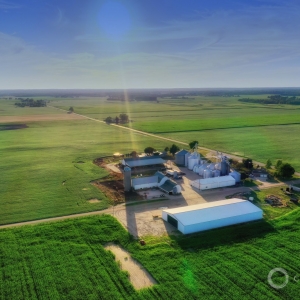The Stream, September 23, 2020: A New Project Could Reduce Agricultural Pollution In The Midwest
The Global Rundown
The University of Minnesota is starting a project that could solve water contamination from agriculture in the United States’ Midwest region. The mysterious deaths of over 300 elephants in Botswana could have been caused by drinking water contaminated with toxic algae. Flash floods in southern France are to blame for the disappearance of two people. A wildfire in Wyoming is closing in on one city’s biggest water reservoir. The ACLU of Michigan is asking federal prisons to reduce to the risk of prisoners contracting Covid-19 from drinking fountains.
“It’s a fundamental human right, and obviously a biological necessity, to be able to drink uncontaminated water in a way that does not, by way of accessing the water, risk your health. Access to water is literally the most basic thing that anybody could possibly need to survive in jail or prison.” – Phil Mayor, ACLU senior staff attorney. The ACLU of Michigan is calling on the Federal Correctional Institution, Milan in Washtenaw County to provide free cups to incarcerated people during Covid-19 out of concern that drinking directly from water fountains puts prisoners at risk for contracting the virus. The Center for Disease Control and Prevention says there is no evidence that the virus can spread by drinking water. However, experts have warned against using drinking fountains if possible because Covid-19 can linger on surfaces. Bottled water was provided with meals to prisoners at Milan early on during the pandemic, but the facility has since stopped the effort because their “proactive efforts in containing the outbreak of Covid-19 were shown to be highly effective,” according to prison spokesperson Daniel Clore. Detroit Free Press
In context: Covid-19 Outbreaks In Prisons Underscore Need for Reform
Latest WaterNews from Circle of Blue
HotSpots H2O: Refugees Left Without Water, Supplies After Moria Camp Burns on Lesbos – The largest refugee camp in Europe caught fire earlier this month, destroying most of the camp and leaving an estimated 12,000 residents homeless and without water, basic hygiene, and food.
What’s Up With Water – September 21, 2020 – This week’s episode covers protests at the La Boquilla dam in northern Mexico, water projects being considered by the managers of the Panama Canal, and a study out of the United States linking water insecurity and psychological stress.
By The Numbers
330 The number of elephants in northwestern Botswana that died earlier this year. Government officials announced Monday the sudden deaths may have occurred because the elephants drank water contaminated by toxic blue-green algae. Cyril Taolo, the acting Director of the Department of Wildlife and National Parks said neurotoxins from cyanobacteria living in contaminated water could have affected the transmission of neurologic signals within an animal, causing paralysis and death. He could not explain why the toxins only affected the elephants, but has ruled out human efforts like anthrax, poaching and sabotage. AP
2 The number of people missing in southern France on Sunday after flash floods caused by storms that dumped a year’s worth of rainfall in parts of the Cevennes hills north of Montpellier. Emergency services mobilized helicopters and 700 personnel to assist inhabitants hit by the flooding, which has also cut off road access, water and electricity supplies to some locations. Around 50 people had been rescued from the flood waters and another 420 have been given emergency shelter, according to Interior Minister Gerard Darmanin. Reuters
Science, Studies, and Reports
The University of Minnesota will lead a $10 million project over the next five years to scale up the production of a new strain of wheatgrass called Kernza, which could provide a solution to increasing pollution from row crops that has threatened the drinking supply of towns throughout the Upper Midwest. Researchers at the university will work with dozens of scientists, farmers and buyers from Kansas, the Great Plains and around the Midwest to increase the yield of the grain and expand the market for restaurants, millers and brewing companies to purchase it. As a perennial grain, the crop requires less fertilizer than corn and soybeans and its roots stay in the ground year-round, stabilizing the soil to prevent erosion and soaking up the chemicals and fertilizers that are contaminating well water. Star Tribune
On the Radar
The Mullen Fire in Wyoming is moving closer to the Rob Roy Reservoir, the city of Cheyenne’s main drinking water reservoir. Water from the reservoir is collected by the Cheyenne Board of Public Utilities (BOPU) and is eventually processed at the Sherard Water Treatment Plant. Because the water treatment plant uses advanced treatment methods, it can treat water quality issues associated with forest fires, keeping Cheyenne’s drinking water safe. Forest fires, such as the Mullen Fire, have the potential to trigger erosion issues that may damage dams, clog pipelines, shrink water storage capacity in reservoirs and alter water quality characteristics. Wyoming Tribune Eagle
In context: Western Wildfires Damage, Contaminate Drinking Water Systems
Jane is a Communications Associate for Circle of Blue. She writes The Stream and has covered domestic and international water issues for Circle of Blue. She is a recent graduate of Grand Valley State University, where she studied Multimedia Journalism and Women, Gender and Sexuality Studies. During her time at Grand Valley, she was the host of the Community Service Learning Center podcast Be the Change. Currently based in Grand Rapids, Michigan, Jane enjoys listening to music, reading and spending time outdoors.






Thank you for sharing this useful post. I appreciate your hard work.